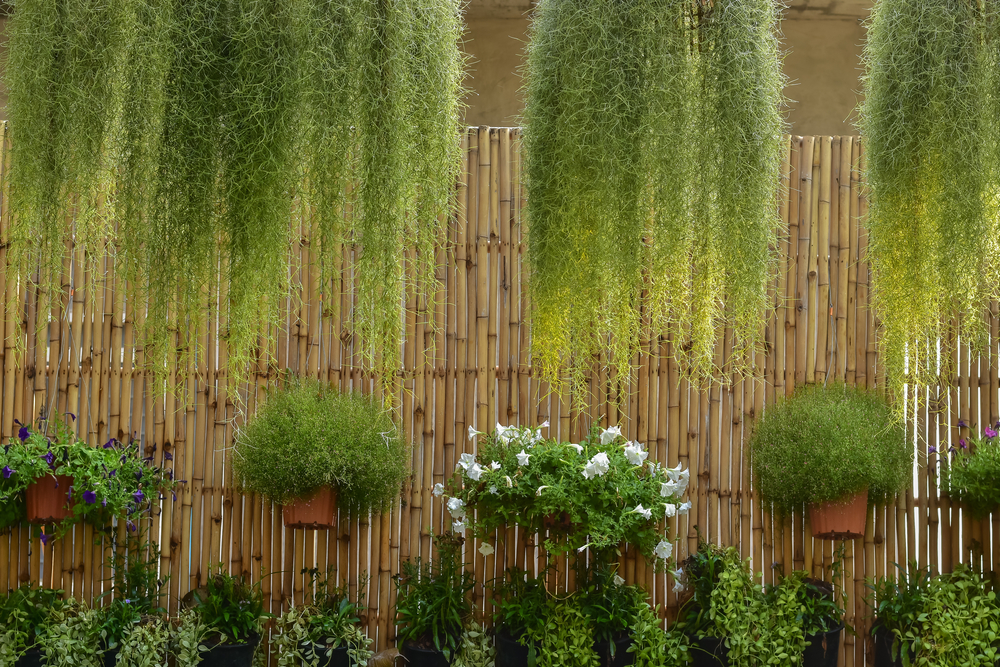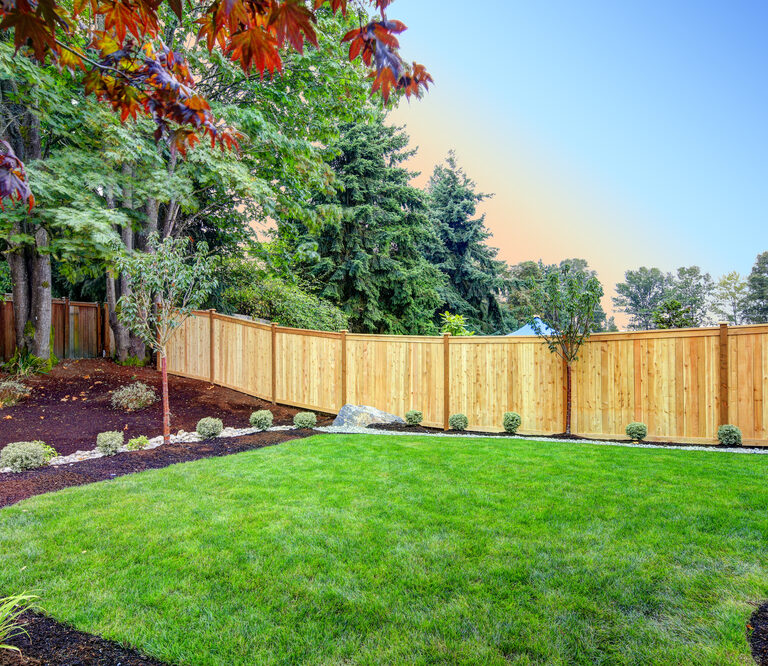A fence is not only the first line of defense against unwanted intruders. It can also help you mark your property, keep pets and the kids in, and add a sense of privacy. But more than that, it’s one of the first things people see from the outside. So you want to make sure you build the right fence for your needs. And when it comes to building fences, choosing the type of material is one of the most difficult things you’ll encounter. But don’t worry, we’re going to walk you through your options and why they’re the best for you.
Wood Fences
You can never go wrong with a solid wood fence. Not only does it add a timeless allure to your home’s exterior, but it’s also one of the most versatile types of fence materials around. Before you go shopping, however, you should check out the most common types of wood fences.
Cedar
Cedarwood is a top choice for many homeowners. It’s generally used for backyard privacy due to its durability. It sports a distinct red hue, and doesn’t warp or shrink like other wood materials. Its main benefits are that it has a tight grain, fewer knots, and it also resists decay naturally. This means it will stand up well to various weather conditions and you won’t need to worry about replacing it every few years.
Redwood
Redwood is significantly more expensive compared to other wood choices. Despite the cost, you’ll be hard-pressed to find an alternative with the same natural luster and malleability. Redwood lumber is naturally resistant to insects, pests, rotting, warping, and shrinking that is usually caused by various weather conditions or varying humidity levels. That said, you should be prepared to do a little bit of yearly maintenance which involves light sanding and applying oil or sealant.
Southern Pine
One of the most affordable lumber purchases you can make for your fence is Southern Pine. Classified as hardwood, it’s one of the most common fencing materials you’ll come across. It has a high-density rating and a beautiful uneven grain which makes it perfect for rustic aesthetics. It’s also considerably low maintenance. We recommend setting them down immediately to lessen the chances of them bowing and twisting.
Bamboo

You’re probably wondering why bamboo isn’t on the list of wood materials. While it’s easy to mistake it for wood since it certainly looks the part, it’s technically not lumber. Instead, it’s a kind of grass that grows quickly, which makes it one of the most easily renewable resources in the market. It’s sturdy, and even comparable to steel.
Since it has Asian origins, it’s more closely related to Asian spaces like spas and dojos. But that doesn’t mean it wouldn’t look good around your property. If you’re looking for a less traditional take on “wood” fencing, this is a great option.
Composite
If you’re partial to the look and feel of wood fences, but don’t care for their affinity to attract insects and degrade over time, not to mention the maintenance that comes with having a wooden fence, you’ll enjoy the structural benefits that come with a composite fence.
They are made of wood fibers combined with plastic polymer. This means they have the structural integrity of PVC or Vinyl fences. These require professional installation and tend to get expensive. However, they’re fairly easy to clean. You’ll only need to spray them with water every so often to maintain its clean exterior.
Vinyl
Vinyl fences are a great choice if you want something that can be easily installed, and remains intact over years of neglect and minimal maintenance. It’s a great option for anyone who has children or pets because they do not splinter which reduces the risk of minor injuries. Unfortunately, its upfront cost is significantly more compared to wood or chain-link fences. And despite its durability, if it does get damaged, you’ll find it quite difficult to repair.
PVC
PVC is a type of vinyl material that is less expensive. It’s most commonly used in third-world countries because of how cost-effective it is. It’s one of the best types of fence materials for many low-maintenance households because it resists breaking down whether biologically or chemically extremely well. It’s durable—and since it’s made of synthetic materials, it will not rot, warp, shrink, splinter, or develop checks like wood.
While it does offer a lot of benefits, it’s also worth noting that it’s the most environmentally-damaging plastic in the world. You might want to take that into consideration when picking out your fence material.
Metal Fences
Metal fences have a certain industrial appeal to them. But more than that, they’re also extremely durable. They’re not as lightweight compared to the other options you’ll find here, but they’re lighter compared to steel and wrought iron fences.
They also don’t do very well when it comes to providing privacy. However, they’re a good option if you want something that will last a long time. You might need to look into a concrete base for these though, as you can’t exactly set them directly into the soil.
Wrought Iron
Wrought iron fences have a certain classic charm to them. Aside from their deep connection to classic and vintage style, they’re one of the most durable types of fence materials you’ll find in the market.
They’re also undeniably beautiful. What’s more, they’re an excellent option if you want to keep your home as safe as possible. That said, it will only last long if you stay on top of their maintenance. You’ll need to sand and repaint them every three years to avoid signs of corrosion, which could affect its structural integrity.
Steel
Steel fences are much more durable compared to their aluminum counterpart. Like wrought iron, it offers less privacy, but its impact-resistant build means your property is safer from probable accidents from motorized vehicles.
They’re incredibly low maintenance as well. They don’t rust over time which means you won’t need to do much to keep it looking like new. Unfortunately, unlike aluminum fences, you’ll need to get these professionally installed. Plus, they’re more expensive.
Chain-Link
Chain-link fences are highly popular because they’re low-cost and durable. They’re great for farm or landscape settings because you’ll be able to view your surroundings more easily. Their unique design also prevents them from getting damaged due to strong winds and snowstorms.
Masonry
If you want a more structured look for your property, you’ll want to look into masonry. More commonly known as bricks, blocks, or stone fences, these fences are certainly beautiful to look at. However, they require professional installation and they tend to get quite expensive. You’ll also need to keep a close eye on its structure since it tends to degrade over time.
Fencing Materials for Special Purposes
In some cases, you might need a fence to serve a particular purpose. For this, you’ll have to look into very specific types of fence materials. And while it’s usually your choice, you might need to be aware of the best materials to use for certain situations.
Electric
If you want to make sure movement in your property is as controlled as possible, you’ll want electric fences. These are usually used alongside chain-link or steel fences. Depending on the current running through your connection of wires (which is usually set in the ground underneath) it may or may not be strong enough to temporarily render an intruder non-responsive. They’re typically used in correctional facilities or off-limit areas.
Barbed Wire
If you want a bit of security, but don’t want to commit to an electrical fence, barbed wire is one of your best choices. It deters any potential intruder from climbing over your fence, which makes it more ideal for homes with children or pets.
Invisible Fencing
Invisible fences are great for households with pets. These require a wire with a current running through it installed underneath the ground of your set boundary. This will mildly shock your pet when they wander over it, preventing them from leaving your property.
Farm Fencing
The type of farm fencing you should look into depends on the kind of livestock you want to keep. If you’re keeping small animals, make sure you opt for fencing that has very few gaps. This will prevent them from wandering from your property. Alternatively, if you plan to keep large animals like horses, you should choose something impact-resistant like galvanized steel.
Final Thoughts
Overall, there are many types of fence materials to choose from. Depending on your individual needs, we suggest you consider your budget and the kind of aesthetic you’re going for as well as its practical uses.
Additionally, you should also consider the amount of maintenance work you’re willing to put in. Some types of material require more frequent upkeep than others, which might affect its appearance and structural integrity.
